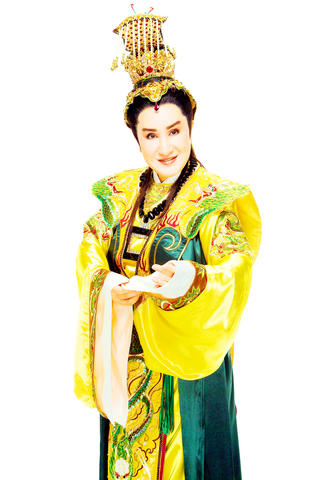A mong fans of gezai opera (歌仔戲), the Taiwanese answer to Beijing opera, the hottest ticket for next week is the premiere of a new production by local opera superstar Yang Li-hua (楊麗花), who is making a comeback after seven years away from the stage. The four performances of Dan Xin Jiu Ju (丹心救主), starting on Thursday, have already sold out despite higher-than-average ticket prices. This comeback, part of National Theater and Concert Hall's 20th anniversary celebrations, will have the star, now 63, pushing her limits as she takes on three very different roles in a complex story of palace intrigue.
Yang is routinely given the title of "National Treasure," and this new work follows on three phenomenally successful performances at the National Theater during the 1990s. Yang was one of the first opera stars to bring gezai opera to major venues such as the National Theater. She has been followed by others, including the Ming Hwa Yuan Taiwanese Opera Company (明華園戲劇團) and the Tang Mei Yun Taiwanese Opera Company (唐美雲歌仔戲團), who have all contributed significantly to lifting gezai opera from the curbside and placing it firmly and confidently in the temples of art and culture. Nevertheless, Yang is credited as the pioneer, and her career, which spans stage, television and film, has been devoted to preserving Taiwan's most popular operatic form.
Gezai opera is often criticized for not having the sophistication or elegance of Beijing opera. It was popular at temple fairs and local celebrations, and appealed to audiences with accounts of involved stories and clever improvisation.

Yang, who was born into a theatrical family began her carrier at just over 10 years old. She was one of the first people to respond to the challenge posed by TV and cinema and use it to her advantage. She helped create many TV operas through the 1970s, and by focusing on characters and plot, helped broaden the audience for gezai opera. Her popularity extends beyond Taiwan, and performances by Yang can even now be seen on Mac TV, the multimedia news and information site of the Overseas Compatriots Affairs Commission (僑務委員會).
Yang's return to the stage has encouraged many other prominent gezai performers to sign up for this production, ensuring that Dan Xin Jiu Ju is likely to be the greatest gathering of gezai talent the stage has seen in a while. Due to the scale and complexity of the production, two directors have been brought in, including the highly-respected Chu Lu-hao (朱陸豪), who has built his reputation in Beijing opera.
Performances of Dan Xin Jiu Ju will take place at the National Theater, Taipei. Performances at 7:30pm Thursday, Oct. 26 and Oct. 27 and at 2:30pm Oct. 28. Tickets are NT$600 to NT$5,000. The show is sold out.


April 28 to May 4 During the Japanese colonial era, a city’s “first” high school typically served Japanese students, while Taiwanese attended the “second” high school. Only in Taichung was this reversed. That’s because when Taichung First High School opened its doors on May 1, 1915 to serve Taiwanese students who were previously barred from secondary education, it was the only high school in town. Former principal Hideo Azukisawa threatened to quit when the government in 1922 attempted to transfer the “first” designation to a new local high school for Japanese students, leading to this unusual situation. Prior to the Taichung First

The Ministry of Education last month proposed a nationwide ban on mobile devices in schools, aiming to curb concerns over student phone addiction. Under the revised regulation, which will take effect in August, teachers and schools will be required to collect mobile devices — including phones, laptops and wearables devices — for safekeeping during school hours, unless they are being used for educational purposes. For Chang Fong-ching (張鳳琴), the ban will have a positive impact. “It’s a good move,” says the professor in the department of

On April 17, Chinese Nationalist Party (KMT) Chairman Eric Chu (朱立倫) launched a bold campaign to revive and revitalize the KMT base by calling for an impromptu rally at the Taipei prosecutor’s offices to protest recent arrests of KMT recall campaigners over allegations of forgery and fraud involving signatures of dead voters. The protest had no time to apply for permits and was illegal, but that played into the sense of opposition grievance at alleged weaponization of the judiciary by the Democratic Progressive Party (DPP) to “annihilate” the opposition parties. Blamed for faltering recall campaigns and faced with a KMT chair

Article 2 of the Additional Articles of the Constitution of the Republic of China (中華民國憲法增修條文) stipulates that upon a vote of no confidence in the premier, the president can dissolve the legislature within 10 days. If the legislature is dissolved, a new legislative election must be held within 60 days, and the legislators’ terms will then be reckoned from that election. Two weeks ago Taipei Mayor Chiang Wan-an (蔣萬安) of the Chinese Nationalist Party (KMT) proposed that the legislature hold a vote of no confidence in the premier and dare the president to dissolve the legislature. The legislature is currently controlled